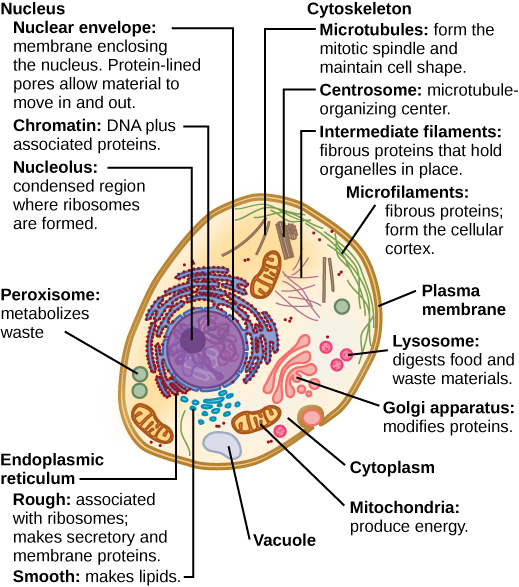
Physiology
Basic Cellular
Regarding the human cell, which of the following cell organelles contains most of the cell's genetic material:
Answer:
The nucleus contains most of the cell's genetic material organised as chromosomes. It also contains the nucleolus, a membrane-less structure which is responsible for the production of ribosomes.Cell Structure
Physiology / Basic Cellular / Cell Structure and Function
Last Updated: 29th July 2024
About half of each cell is filled with cytosol, a viscous, protein-rich fluid between the internal structures which consist of organelles, which are themselves enclosed by lipid membranes, and components of the cytoskeleton which provide structural stability.

Cell Structure. (Image by CNX OpenStax [CC BY 4.0 , via Wikimedia Commons)
Nucleus
The nucleus contains most of the cell's genetic material organised as chromosomes. It also contains the nucleolus, a membrane-less structure which is responsible for the production of ribosomes.
Mitochondria
Mitochondria are responsible for the production of chemical energy in the form of ATP by oxidative phosphorylation, which is then used by all energy-requiring reactions. Mitochondria are also involved in other cellular processes, including Ca2+ homeostasis and signalling. Mitochondria contain a small amount of maternal DNA.
Endoplasmic reticulum
The smooth endoplasmic reticulum serves as a store for intracellular Ca2+ and is the major site of lipid production (including triglyceride, steroid and phospholipid synthesis).
The rough endoplasmic reticulum has ribosomes bound to its outer surface, which are responsible for protein assembly and post-translational processing of proteins. This includes trimming amino acid chains to the right length, protein folding, addition of polysaccharide chains and identification of improperly folded proteins, which are tagged for subsequent destruction by lysosomes.
Golgi apparatus
The Golgi apparatus packages proteins for delivery to specific intracellular destinations or into vesicles which can then be secreted from the cell for extracellular action.
Lysosomes
Lysosomes, containing digestive enzymes, are responsible for the digestion and breakdown of unwanted and defective proteins, the recycling of raw materials and the prevention of accumulation of waste.
Report A Problem
Is there something wrong with this question? Let us know and we’ll fix it as soon as possible.
Loading Form...
- Biochemistry
- Blood Gases
- Haematology
| Biochemistry | Normal Value |
|---|---|
| Sodium | 135 – 145 mmol/l |
| Potassium | 3.0 – 4.5 mmol/l |
| Urea | 2.5 – 7.5 mmol/l |
| Glucose | 3.5 – 5.0 mmol/l |
| Creatinine | 35 – 135 μmol/l |
| Alanine Aminotransferase (ALT) | 5 – 35 U/l |
| Gamma-glutamyl Transferase (GGT) | < 65 U/l |
| Alkaline Phosphatase (ALP) | 30 – 135 U/l |
| Aspartate Aminotransferase (AST) | < 40 U/l |
| Total Protein | 60 – 80 g/l |
| Albumin | 35 – 50 g/l |
| Globulin | 2.4 – 3.5 g/dl |
| Amylase | < 70 U/l |
| Total Bilirubin | 3 – 17 μmol/l |
| Calcium | 2.1 – 2.5 mmol/l |
| Chloride | 95 – 105 mmol/l |
| Phosphate | 0.8 – 1.4 mmol/l |
| Haematology | Normal Value |
|---|---|
| Haemoglobin | 11.5 – 16.6 g/dl |
| White Blood Cells | 4.0 – 11.0 x 109/l |
| Platelets | 150 – 450 x 109/l |
| MCV | 80 – 96 fl |
| MCHC | 32 – 36 g/dl |
| Neutrophils | 2.0 – 7.5 x 109/l |
| Lymphocytes | 1.5 – 4.0 x 109/l |
| Monocytes | 0.3 – 1.0 x 109/l |
| Eosinophils | 0.1 – 0.5 x 109/l |
| Basophils | < 0.2 x 109/l |
| Reticulocytes | < 2% |
| Haematocrit | 0.35 – 0.49 |
| Red Cell Distribution Width | 11 – 15% |
| Blood Gases | Normal Value |
|---|---|
| pH | 7.35 – 7.45 |
| pO2 | 11 – 14 kPa |
| pCO2 | 4.5 – 6.0 kPa |
| Base Excess | -2 – +2 mmol/l |
| Bicarbonate | 24 – 30 mmol/l |
| Lactate | < 2 mmol/l |

